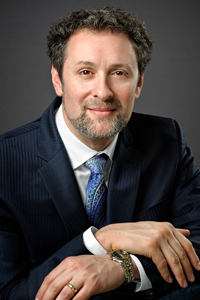In the beginning of Parashat Chayei Sarah, Abraham introduces himself to the people of Canaan, the land that has been promised to his descendants. In doing so, he also introduces us to ourselves: “Ger v’toshav anochi imachem,” translated as “I am a resident alien among you.” (Genesis 23:4).
The JPS translation offered in the URJ Plaut Torah Commentary is accurate, but it cannot truly do justice to these words. Instead of some demographic category, , the Hebrew words translated as “resident alien,” describe the inherent challenge of the human condition. Abraham identifies himself as an outsider, as a ger, meaning a stranger. Is it possible that the citizens of ancient Hebron would have mistaken him for a local? Using this term, the father of the Jewish people makes a statement: Regardless of outward similarities, he stands apart.
While Abraham possibly feels unique as the founder of monotheism in a pagan world, I think something more basic is in play: Each of us is eventually a ger. Our inner lives are experiences that only we – and the Holy Blessed One – can truly understand. Each of us stands apart: It’s a basic element of the human condition. Even in our most intimate connections and relationships, others must come to know us from the outside.
Nevertheless, we are also a toshav, a resident among others. The pandemic has reminded me and so many others with whom I speak that our nature is to be social. While it is normal to feel alone, we find it difficult to exist when we are completely distanced from others. We need to feel that we share a residence in this world with others. This distinction is existential rather than geographic; whether we are physically in contact with others or not, we need to be part of a community, a collective.
This week’s Torah portion addresses the difficulty of overcoming loneliness. In Genesis 23, Abraham seeks permanent possession of a piece of land in which to lay his beloved Sarah to rest. Rituals of burial and mourning give us a sense of eternity and continuity. It is not merely graves that need perpetual care; we too need reassurance that love and spirit can survive beyond our mere moments together in this realm.
This summer, I was pained and privileged to stand with families as they buried their loved ones who died due to COVID-19 without the usual supportive benefit of funeral gatherings and visits. The result, of course, was difficult and distressing. Nevertheless, I watched families take comfort in some of our core burial rituals that have remained the same for millennia. I will never forget how one family, allowed only 10 people at the burial of their beloved, shoveled earth into the grave while quietly and gently pausing to share stories that moved their hearts. In that moment, I could feel the presence of their loved one. Love is indeed stronger than death!
The theme of love also dominates the remainder of the Torah portion. Abraham sends his agent Eliezer to find a fitting partner for Isaac. While he seeks out family, as was customary in ancient times, the central traits he seeks are character and heart. Abraham and Sarah were known for their hospitality and welcoming all into their tent. Through Eliezer, Abraham seeks a spouse for Isaac who shares this essential value.
In the eyes of our tradition, neither Rebecca nor Isaac are passive partners. Rebecca chooses to to be with someone who shares her values. When she and Eliezer arrive back in the Land of Israel, Isaac is waiting. Genesis 24:63 says: “And Isaac went out walking in the field toward evening and, looking up, he saw camels approaching.” The commentators, led by Rashi, see this verse as less about walking and more about praying, about pouring out his sadness over his mother and his hopes for the future. In doing so, tradition teaches that Isaac established the afternoon prayer service on that very day.
This moment, like most spiritual moments, is not about words in a . By setting a profound example for us, Isaac overcomes his own profound loneliness by realizing his hope of finding a soulmate and a true partner in life. Even if we are lucky enough to have such a partner, we must work to know one another each and every day. When we respect the loving memories of those who have gone before us, when we invest in our key relationships today, we possess all that is truly valuable in the human experience.
Explore Jewish Life and Get Inspired
Subscribe for Emails


